lock LINCOLN MKT 2015 Owners Manual
[x] Cancel search | Manufacturer: LINCOLN, Model Year: 2015, Model line: MKT, Model: LINCOLN MKT 2015Pages: 500, PDF Size: 4.94 MB
Page 2 of 500
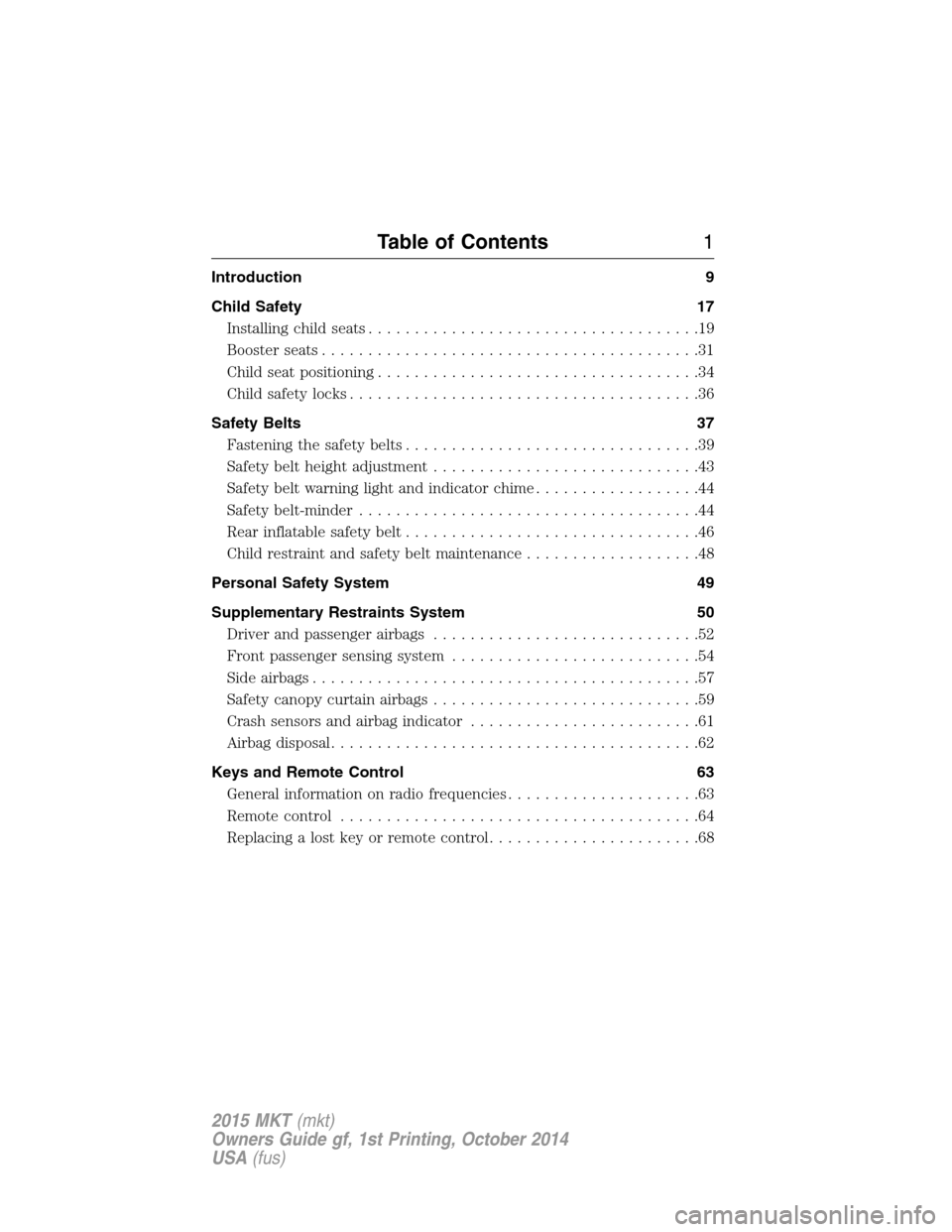
Introduction 9
Child Safety 17
Installing child seats....................................19
Booster seats.........................................31
Child seat positioning...................................34
Child safety locks......................................36
Safety Belts 37
Fastening the safety belts................................39
Safety belt height adjustment.............................43
Safetybeltwarninglightandindicatorchime..................44
Safety belt-minder.....................................44
Rear inflatable safety belt................................46
Child restraint and safety belt maintenance...................48
Personal Safety System 49
Supplementary Restraints System 50
Driver and passenger airbags.............................52
Front passenger sensing system...........................54
Side airbags..........................................57
Safety canopy curtain airbags.............................59
Crash sensors and airbag indicator.........................61
Airbag disposal........................................62
Keys and Remote Control 63
General information on radio frequencies.....................63
Remote control.......................................64
Replacing a lost key or remote control.......................68
Table of Contents1
2015 MKT(mkt)
Owners Guide gf, 1st Printing, October 2014
USA(fus)
Page 3 of 500
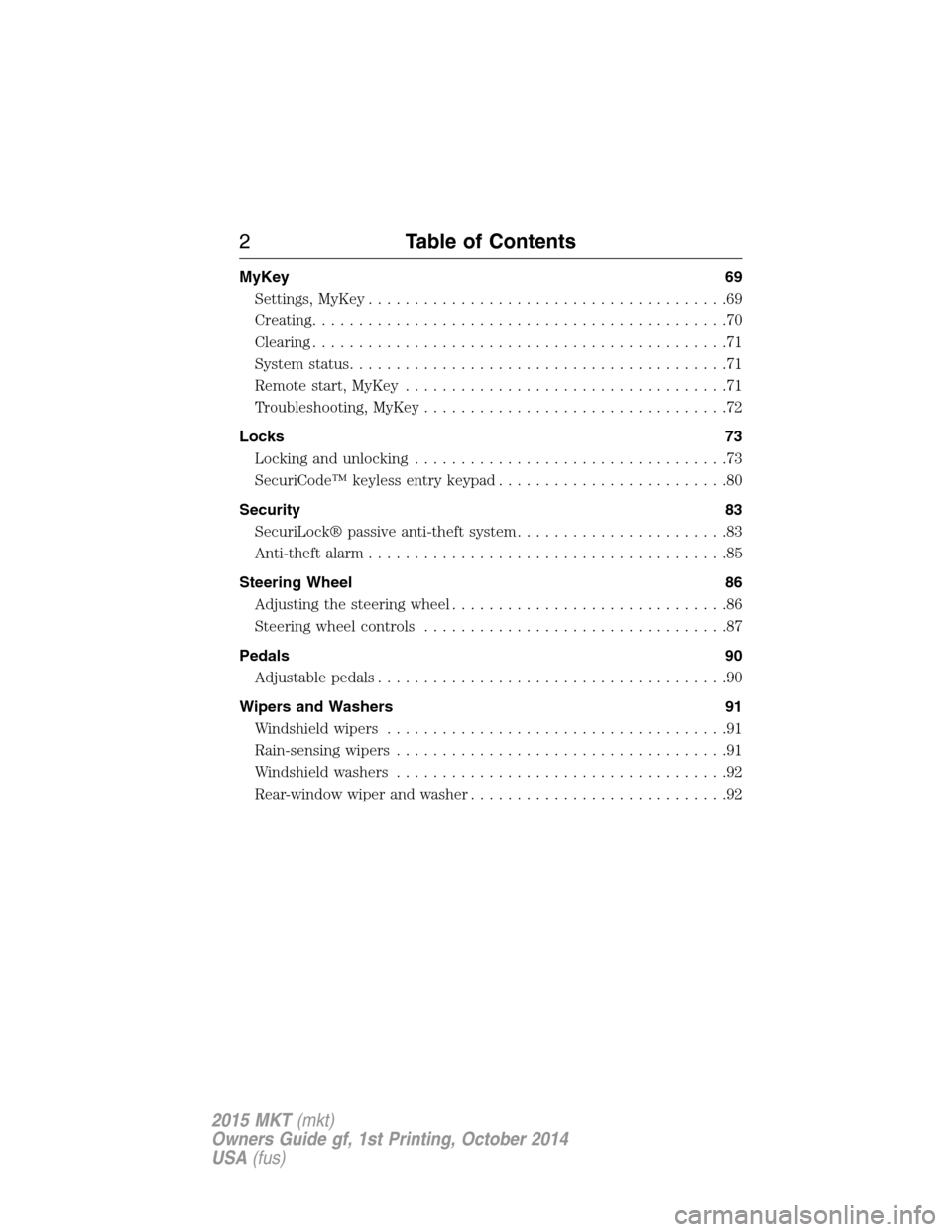
MyKey 69
Settings, MyKey.......................................69
Creating.............................................70
Clearing.............................................71
System status.........................................71
Remote start, MyKey...................................71
Troubleshooting, MyKey.................................72
Locks 73
Locking and unlocking..................................73
SecuriCode™ keyless entry keypad.........................80
Security 83
SecuriLock® passive anti-theft system.......................83
Anti-theft alarm.......................................85
Steering Wheel 86
Adjusting the steering wheel..............................86
Steering wheel controls.................................87
Pedals 90
Adjustable pedals......................................90
Wipers and Washers 91
Windshield wipers.....................................91
Rain-sensing wipers....................................91
Windshield washers....................................92
Rear-window wiper and washer............................92
2Table of Contents
2015 MKT(mkt)
Owners Guide gf, 1st Printing, October 2014
USA(fus)
Page 5 of 500
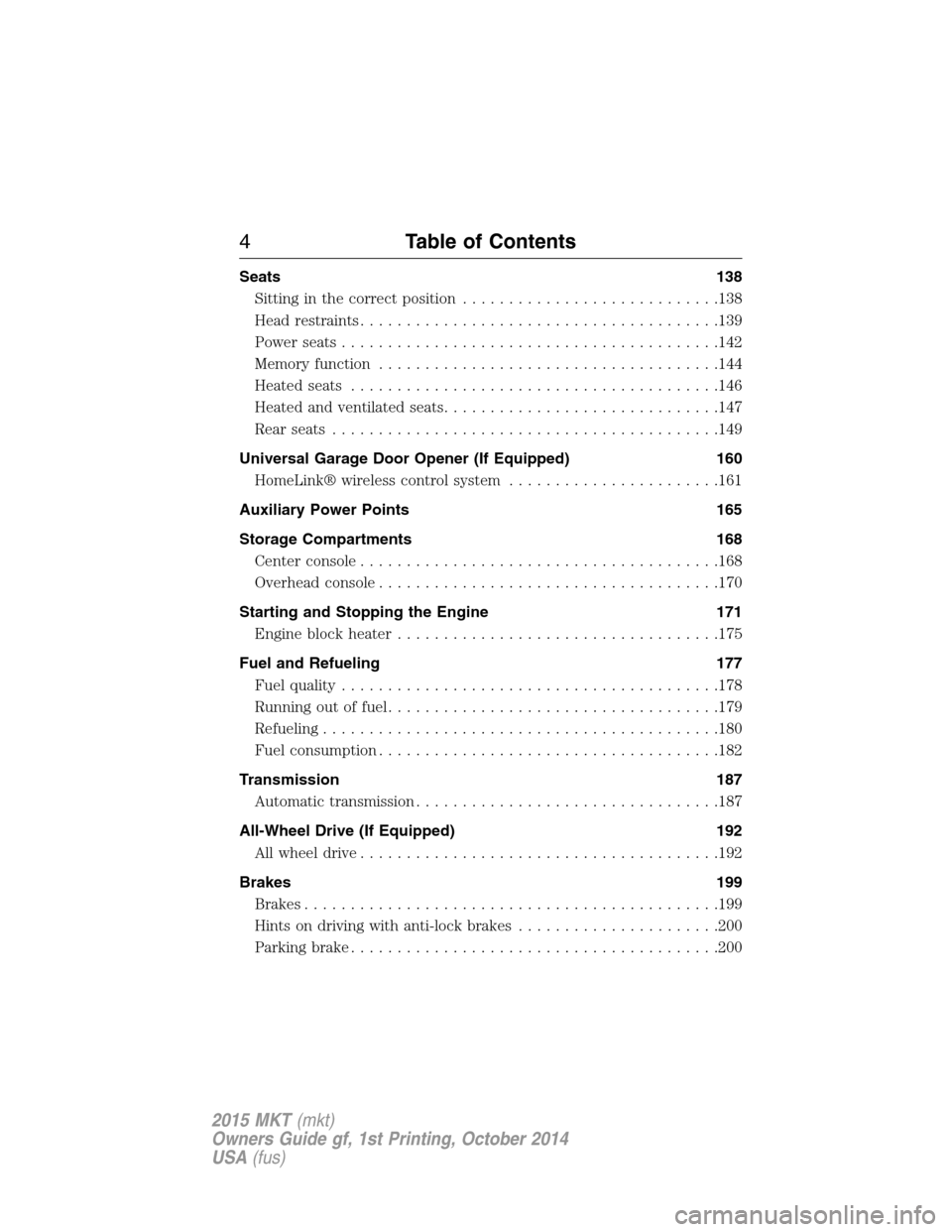
Seats 138
Sitting in the correct position............................138
Head restraints.......................................139
Power seats.........................................142
Memory function.....................................144
Heated seats........................................146
Heated and ventilated seats..............................147
Rear seats..........................................149
Universal Garage Door Opener (If Equipped) 160
HomeLink® wireless control system.......................161
Auxiliary Power Points 165
Storage Compartments 168
Center console.......................................168
Overhead console.....................................170
Starting and Stopping the Engine 171
Engine block heater...................................175
Fuel and Refueling 177
Fuel quality.........................................178
Running out of fuel....................................179
Refueling...........................................180
Fuel consumption.....................................182
Transmission 187
Automatic transmission.................................187
All-Wheel Drive (If Equipped) 192
All wheel drive.......................................192
Brakes 199
Brakes.............................................199
Hints on driving with anti-lock brakes......................200
Parking brake........................................200
4Table of Contents
2015 MKT(mkt)
Owners Guide gf, 1st Printing, October 2014
USA(fus)
Page 11 of 500
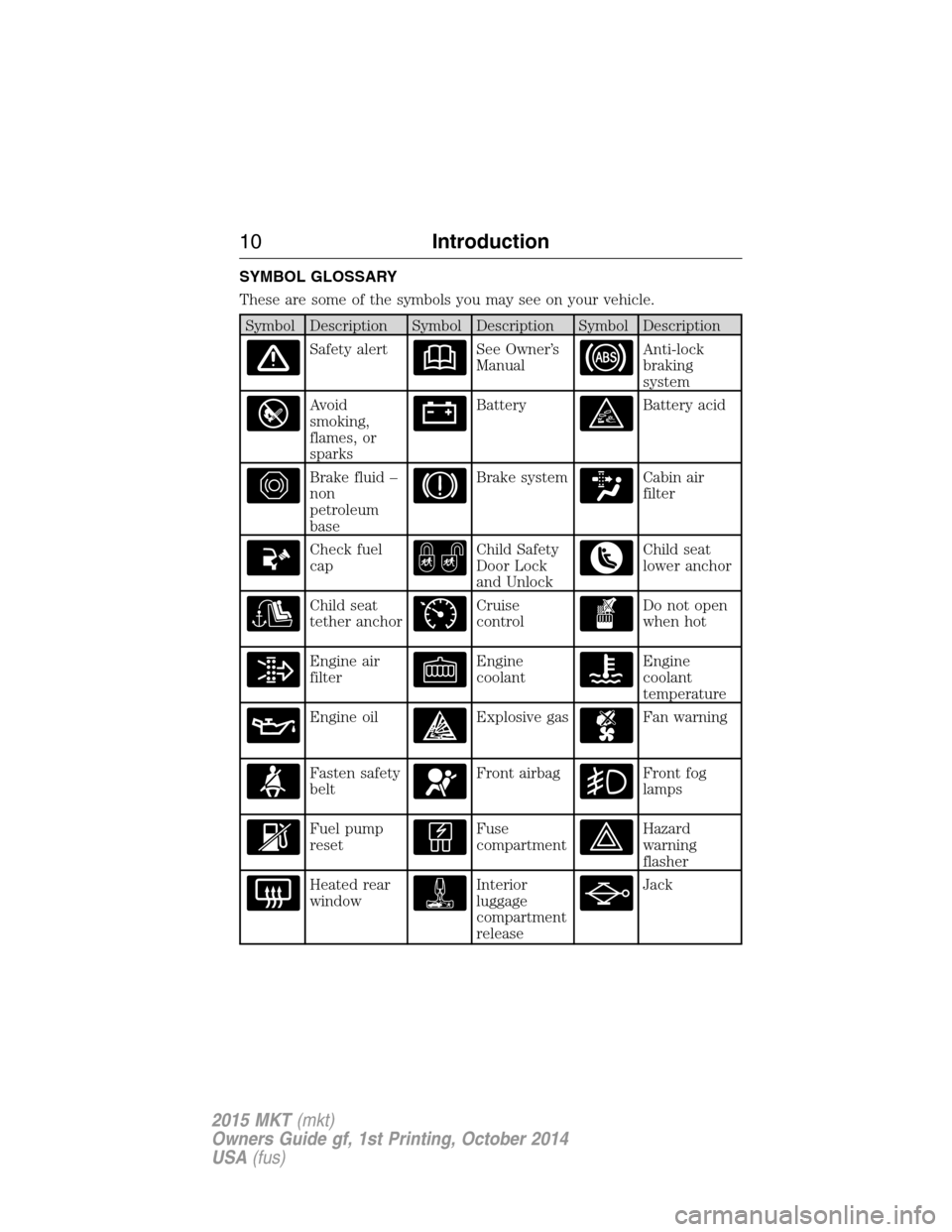
SYMBOL GLOSSARY
These are some of the symbols you may see on your vehicle.
Symbol Description Symbol Description Symbol Description
Safety alertSee Owner’s
ManualAnti-lock
braking
system
Avoid
smoking,
flames, or
sparksBatteryBattery acid
Brake fluid –
non
petroleum
baseBrake systemCabin air
filter
Check fuel
capChild Safety
Door Lock
and UnlockChild seat
lower anchor
Child seat
tether anchorCruise
controlDo not open
when hot
Engine air
filterEngine
coolantEngine
coolant
temperature
Engine oilExplosive gasFan warning
Fasten safety
beltFront airbagFront fog
lamps
Fuel pump
resetFuse
compartmentHazard
warning
flasher
Heated rear
windowInterior
luggage
compartment
releaseJack
10Introduction
2015 MKT(mkt)
Owners Guide gf, 1st Printing, October 2014
USA(fus)
Page 12 of 500
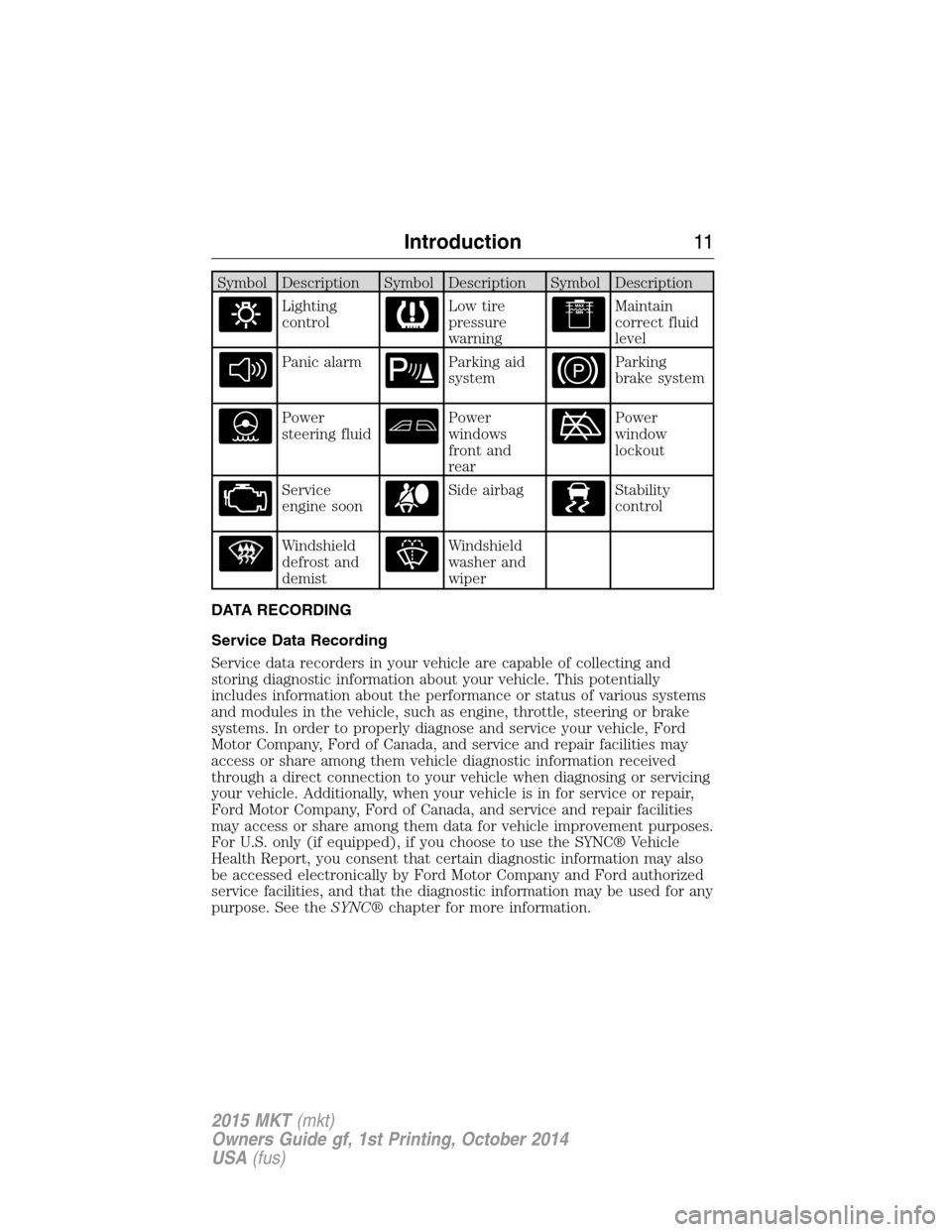
Symbol Description Symbol Description Symbol Description
Lighting
controlLow tire
pressure
warningMaintain
correct fluid
level
Panic alarmParking aid
systemParking
brake system
Power
steering fluidPower
windows
front and
rearPower
window
lockout
Service
engine soonSide airbagStability
control
Windshield
defrost and
demistWindshield
washer and
wiper
DATA RECORDING
Service Data Recording
Service data recorders in your vehicle are capable of collecting and
storing diagnostic information about your vehicle. This potentially
includes information about the performance or status of various systems
and modules in the vehicle, such as engine, throttle, steering or brake
systems. In order to properly diagnose and service your vehicle, Ford
Motor Company, Ford of Canada, and service and repair facilities may
access or share among them vehicle diagnostic information received
through a direct connection to your vehicle when diagnosing or servicing
your vehicle. Additionally, when your vehicle is in for service or repair,
Ford Motor Company, Ford of Canada, and service and repair facilities
may access or share among them data for vehicle improvement purposes.
For U.S. only (if equipped), if you choose to use the SYNC® Vehicle
Health Report, you consent that certain diagnostic information may also
be accessed electronically by Ford Motor Company and Ford authorized
service facilities, and that the diagnostic information may be used for any
purpose. See theSYNC®chapter for more information.
Introduction11
2015 MKT(mkt)
Owners Guide gf, 1st Printing, October 2014
USA(fus)
Page 20 of 500
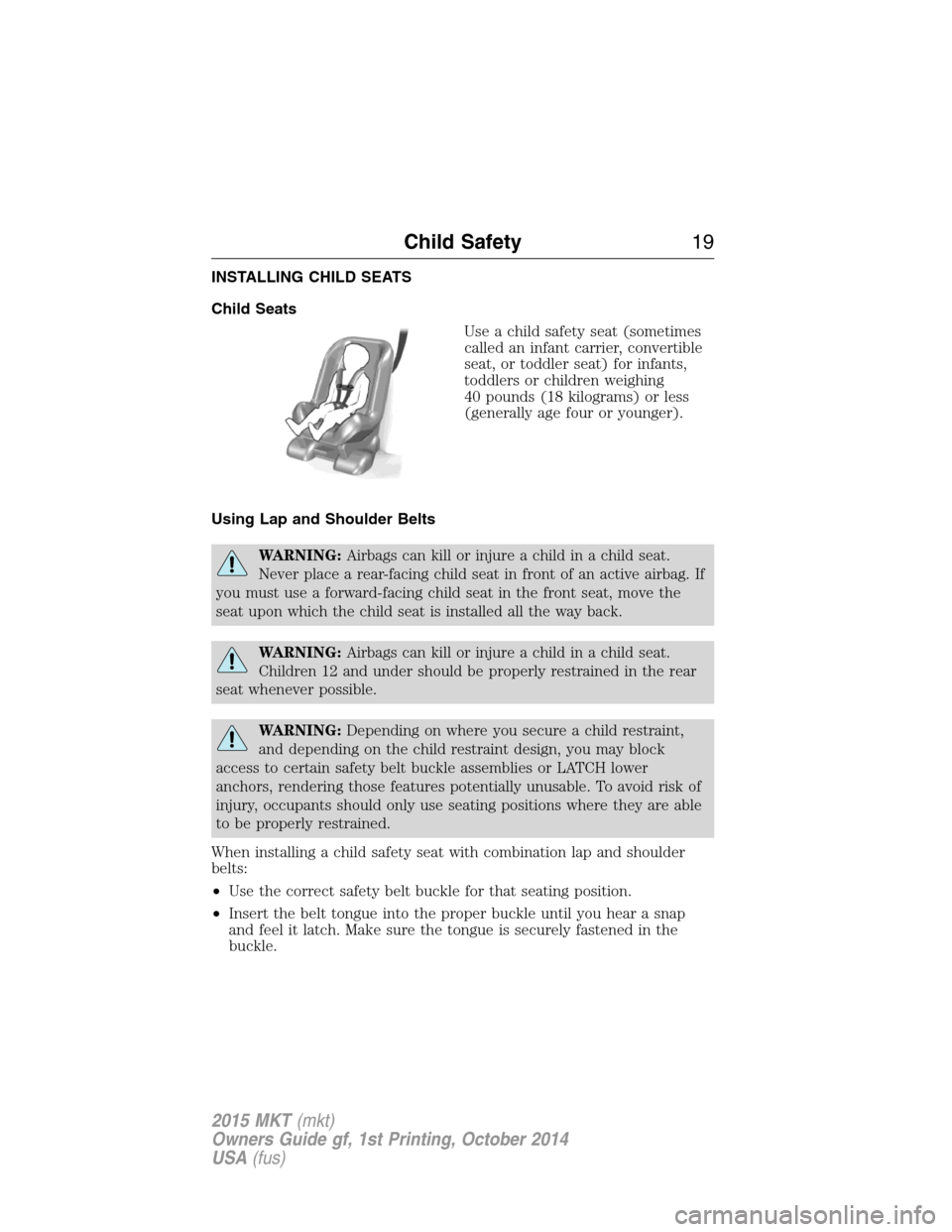
INSTALLING CHILD SEATS
Child Seats
Use a child safety seat (sometimes
called an infant carrier, convertible
seat, or toddler seat) for infants,
toddlers or children weighing
40 pounds (18 kilograms) or less
(generally age four or younger).
Using Lap and Shoulder Belts
WARNING:Airbags can kill or injure a child in a child seat.
Never place a rear-facing child seat in front of an active airbag. If
you must use a forward-facing child seat in the front seat, move the
seat upon which the child seat is installed all the way back.
WARNING:Airbags can kill or injure a child in a child seat.
Children 12 and under should be properly restrained in the rear
seat whenever possible.
WARNING:Depending on where you secure a child restraint,
and depending on the child restraint design, you may block
access to certain safety belt buckle assemblies or LATCH lower
anchors, rendering those features potentially unusable. To avoid risk of
injury, occupants should only use seating positions where they are able
to be properly restrained.
When installing a child safety seat with combination lap and shoulder
belts:
•Use the correct safety belt buckle for that seating position.
•Insert the belt tongue into the proper buckle until you hear a snap
and feel it latch. Make sure the tongue is securely fastened in the
buckle.
Child Safety19
2015 MKT(mkt)
Owners Guide gf, 1st Printing, October 2014
USA(fus)
Page 21 of 500
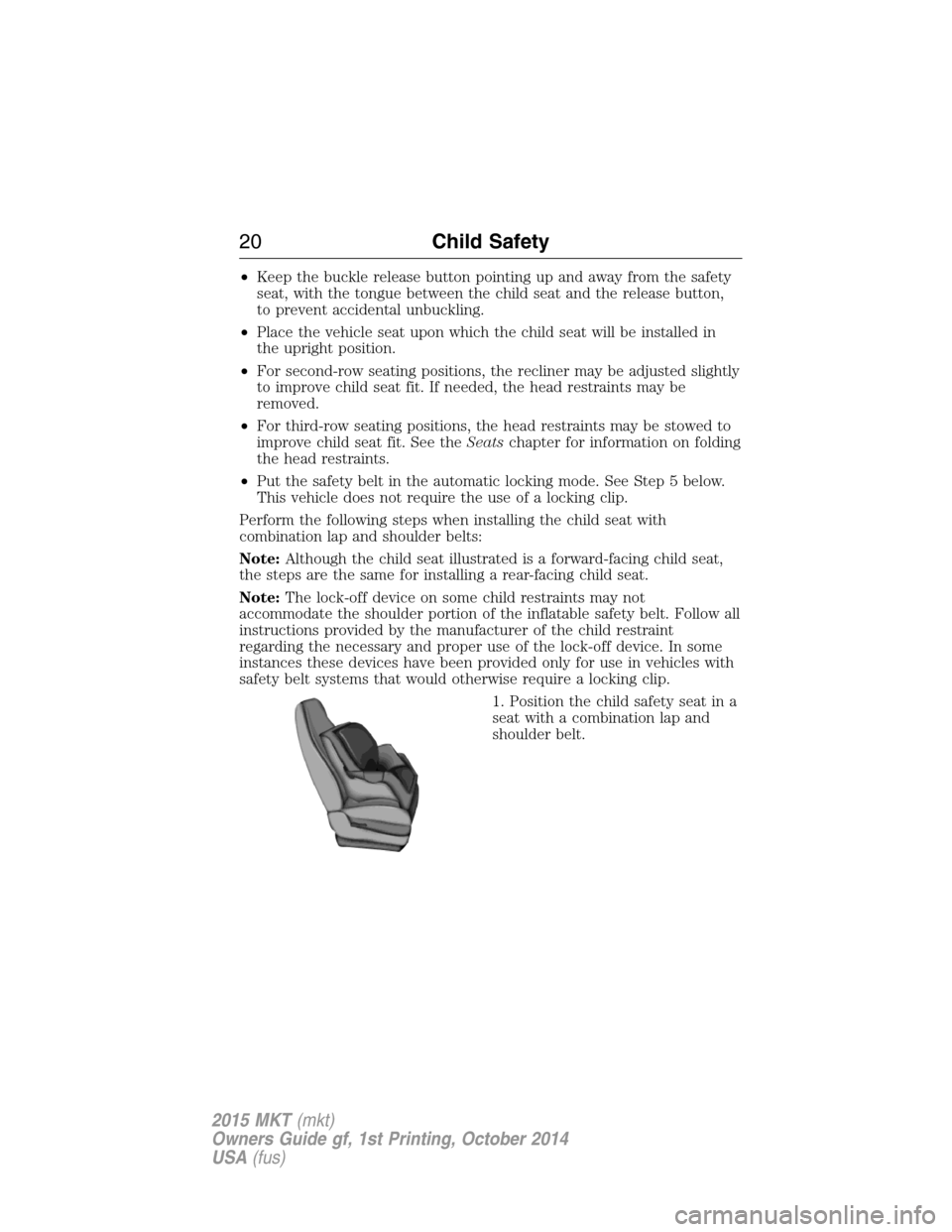
•Keep the buckle release button pointing up and away from the safety
seat, with the tongue between the child seat and the release button,
to prevent accidental unbuckling.
•Place the vehicle seat upon which the child seat will be installed in
the upright position.
•For second-row seating positions, the recliner may be adjusted slightly
to improve child seat fit. If needed, the head restraints may be
removed.
•For third-row seating positions, the head restraints may be stowed to
improve child seat fit. See theSeatschapter for information on folding
the head restraints.
•Put the safety belt in the automatic locking mode. See Step 5 below.
This vehicle does not require the use of a locking clip.
Perform the following steps when installing the child seat with
combination lap and shoulder belts:
Note:Although the child seat illustrated is a forward-facing child seat,
the steps are the same for installing a rear-facing child seat.
Note:The lock-off device on some child restraints may not
accommodate the shoulder portion of the inflatable safety belt. Follow all
instructions provided by the manufacturer of the child restraint
regarding the necessary and proper use of the lock-off device. In some
instances these devices have been provided only for use in vehicles with
safety belt systems that would otherwise require a locking clip.
1. Position the child safety seat in a
seat with a combination lap and
shoulder belt.
20Child Safety
2015 MKT(mkt)
Owners Guide gf, 1st Printing, October 2014
USA(fus)
Page 23 of 500
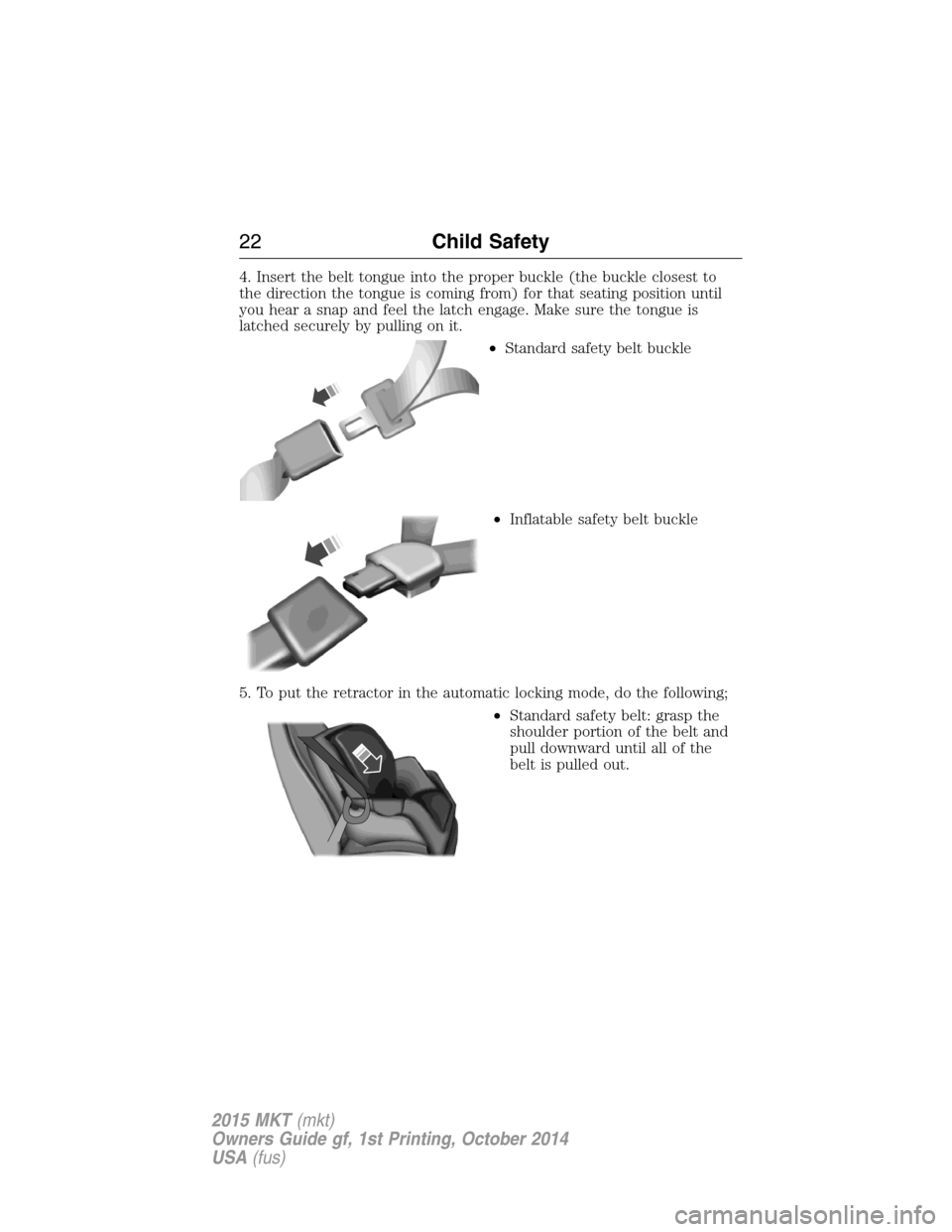
4. Insert the belt tongue into the proper buckle (the buckle closest to
the direction the tongue is coming from) for that seating position until
you hear a snap and feel the latch engage. Make sure the tongue is
latched securely by pulling on it.
•Standard safety belt buckle
•Inflatable safety belt buckle
5. To put the retractor in the automatic locking mode, do the following;
•Standard safety belt: grasp the
shoulder portion of the belt and
pull downward until all of the
belt is pulled out.
22Child Safety
2015 MKT(mkt)
Owners Guide gf, 1st Printing, October 2014
USA(fus)
Page 24 of 500
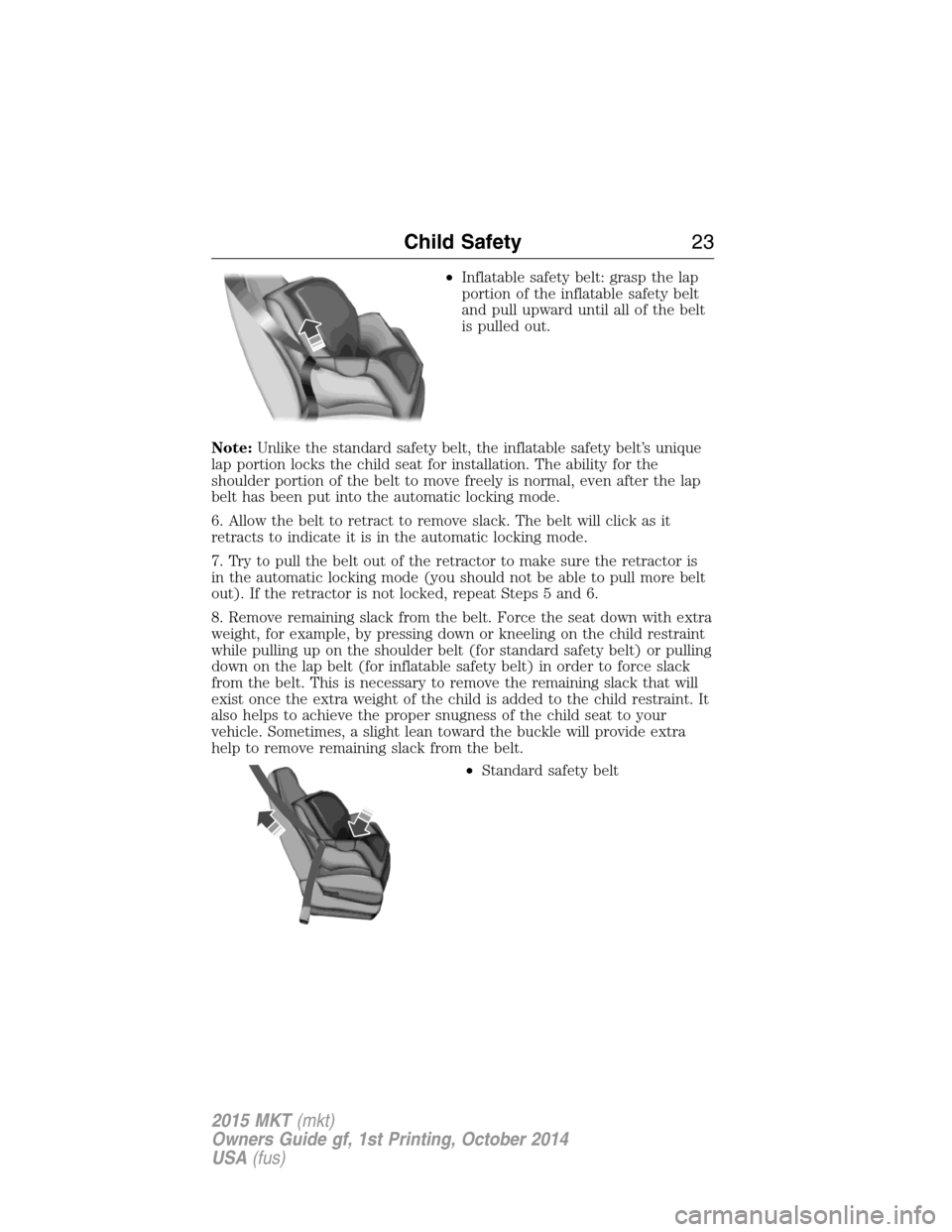
•Inflatable safety belt: grasp the lap
portion of the inflatable safety belt
and pull upward until all of the belt
is pulled out.
Note:Unlike the standard safety belt, the inflatable safety belt’s unique
lap portion locks the child seat for installation. The ability for the
shoulder portion of the belt to move freely is normal, even after the lap
belt has been put into the automatic locking mode.
6. Allow the belt to retract to remove slack. The belt will click as it
retracts to indicate it is in the automatic locking mode.
7. Try to pull the belt out of the retractor to make sure the retractor is
in the automatic locking mode (you should not be able to pull more belt
out). If the retractor is not locked, repeat Steps 5 and 6.
8. Remove remaining slack from the belt. Force the seat down with extra
weight, for example, by pressing down or kneeling on the child restraint
while pulling up on the shoulder belt (for standard safety belt) or pulling
down on the lap belt (for inflatable safety belt) in order to force slack
from the belt. This is necessary to remove the remaining slack that will
exist once the extra weight of the child is added to the child restraint. It
also helps to achieve the proper snugness of the child seat to your
vehicle. Sometimes, a slight lean toward the buckle will provide extra
help to remove remaining slack from the belt.
•Standard safety belt
Child Safety23
2015 MKT(mkt)
Owners Guide gf, 1st Printing, October 2014
USA(fus)
Page 25 of 500
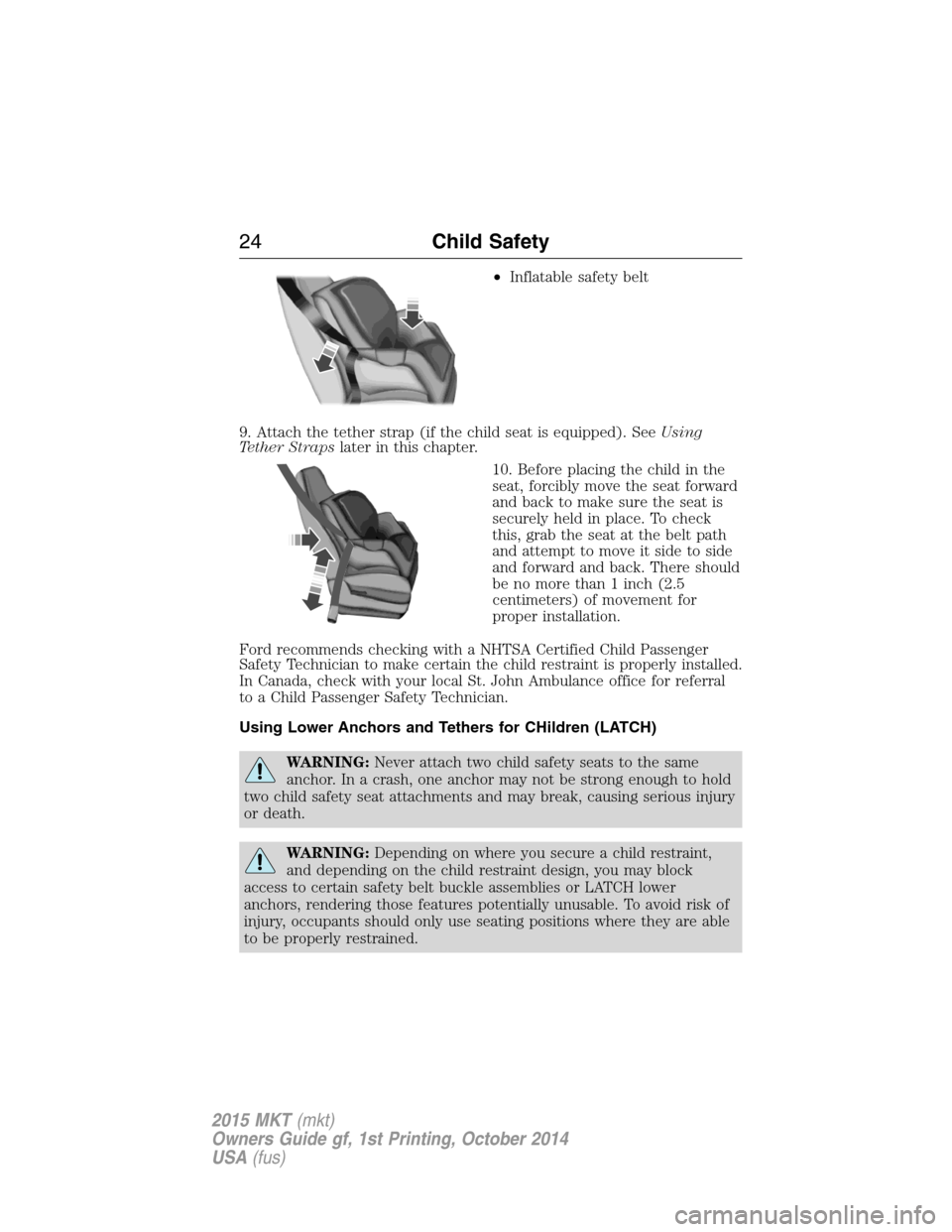
•Inflatable safety belt
9. Attach the tether strap (if the child seat is equipped). SeeUsing
Tether Strapslater in this chapter.
10. Before placing the child in the
seat, forcibly move the seat forward
and back to make sure the seat is
securely held in place. To check
this, grab the seat at the belt path
and attempt to move it side to side
and forward and back. There should
be no more than 1 inch (2.5
centimeters) of movement for
proper installation.
Ford recommends checking with a NHTSA Certified Child Passenger
Safety Technician to make certain the child restraint is properly installed.
In Canada, check with your local St. John Ambulance office for referral
to a Child Passenger Safety Technician.
Using Lower Anchors and Tethers for CHildren (LATCH)
WARNING:Never attach two child safety seats to the same
anchor. In a crash, one anchor may not be strong enough to hold
two child safety seat attachments and may break, causing serious injury
or death.
WARNING:Depending on where you secure a child restraint,
and depending on the child restraint design, you may block
access to certain safety belt buckle assemblies or LATCH lower
anchors, rendering those features potentially unusable. To avoid risk of
injury, occupants should only use seating positions where they are able
to be properly restrained.
24Child Safety
2015 MKT(mkt)
Owners Guide gf, 1st Printing, October 2014
USA(fus)